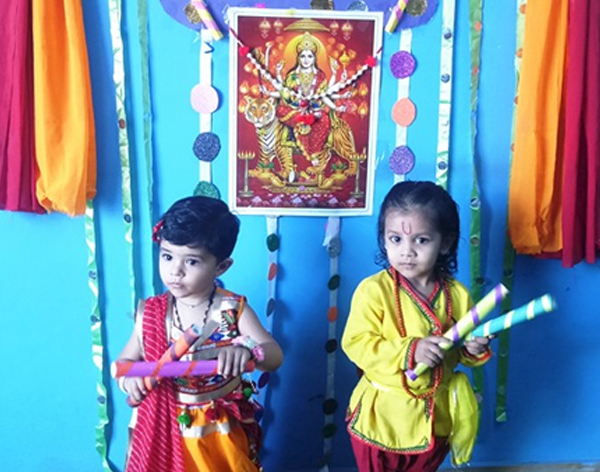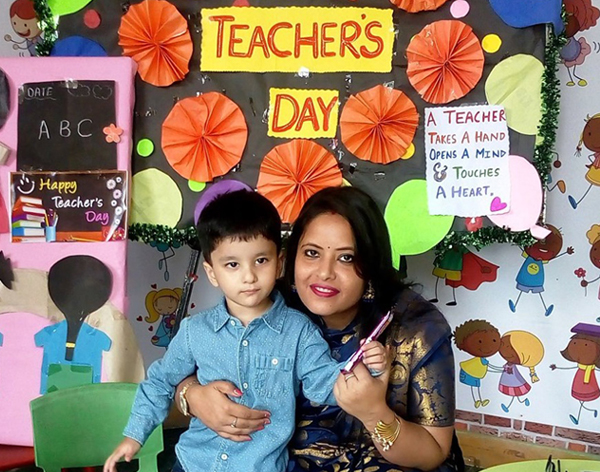Methodology
Our methodology is an amalgamation of tried and tested Indian teaching methodology with the Montessori system which in turn is integrated with novo technologies and innovative teaching tools which are developed with constant R&D of our consultants and teachers. Since experiential learning is most adaptive at this age hence our curriculum is integrated with projects and themes.
Aadi play school with its “child first” philosophy and the new age mindful curriculum, emphasizes that the child will play, learn and grow to imbibe essential life skills through exploration and discovery. Integrated use of scientifically designed game, toys and technology in our aadi school curriculum makes learning fun and engaging for children.
Curriculum
Curriculum is designed in such a way that it strikes the right balance between the academic needs of the children at this age beautifully balanced with the skills that children can learn at this stage which are the learning’s for life at large.
Our curriculum pivots around a tri-way learning methodologies in which teachers, parents and above all our tiny tots are equal participants.
Social and emotional to foster a child’s sense of self, enhance his or her ability to make friends and create openness to learning. Physical development to strengthen large and small muscles, co-ordinate and improve overall health and growth. Creative expression and aesthetic development to foster a child’s appreciation for the arts music, movement, dramatic play and visual arts. Express feeling (selecting bright colors for a painting to match a playful mood). Learn to channel frustration and anger in our socially acceptable way (punching and pounding clay). Assert individuality (drawing a circle that differs in colors and design from the traditional)
We go above and beyond standard with our small sizes and high teachers to student’s ratio. This means your child has more opportunity to express themselves and receive more individual attention from teachers.
Imagine
- A school that understand the need for a higher standard of education for children in the most important age of their lives.
- A school where children learn to think globally from a young age.
Explore
The aadi approach to early childhood learning:
- Literacy
- Numeracy
- Science
- Dramatic Play
- Physical Education
Create
- Children who have healthy minds and bodies.
- Children who are confident and self-aware.
- Children who have a head start in all aspects of education.
Other teaching methodologies
Numeracy
Our numeracy curriculum uses of a lot of concepts and teaching techniques. We teach content including numbers, calculations, patterns, sorting, and spatial senses.
We have a structured Numeracy curriculum, but we also understand that learning arises constantly from events and happenings, play and routines that occur naturally within the early childhood learning environment.
We encourage teachers to take their lead from the children and their interests and to use the opportunities that arise in the context of their play to strengthen children’s mathematical understandings.
We also recognize the importance of following up on children’s responses to provoke mathematical thinking for example asking children to describe and explain their thinking helps them to clarify their own ideas and gives us insight into their current understanding.
Numeracy work is always supplemented by visual aids, and by using concrete materials. We understand the importance of giving children a solid foundation in math, so we make sure each concept is clear and enjoyable by including a lot of games and activities to aid in the learning process.
Literacy
Providing a literacy rich environment for children in their early years will create the foundation for the children’s future and writing ability.
We take care to stock our school with high quality picture books-both fiction and non-fiction. We provide a lending library of level readers for our older classes and make sure that story time is part of our daily’s routine.
Our literacy program has been developed by aadi professional teaching staff. We believe that by introducing components of reading and writing through games and songs, that children can develop skills and confidence at an early age. From our junior pre-nursery, children begin reading level readers and find instant success due to their strong phonics base. This builds confidence and ensures enjoyment in the reading process.
Theme
Our theme curriculum is designed to expose children to a wide range of concept and vocabulary. They are designed to feature many social studies and science based content. We start from the familiar, and over their years at aadi we build upon previous knowledge to increase the children’s knowledge and understandings.
The main goals of our theme curriculum are:
- To learn through teacher-led play and real experiences
- To expose children to a wide range of concepts and vocabulary
- To make predictions and hypothesize, to research and experiment
We learn using books, songs, art & craft, science, exploration and imaginative play.
Below is an example of the way our theme curriculum progresses over the years at AADI PLAY SCHOOL:
Social & Life Skills
Social Skills are any skills that facilitate interaction and communication with others. Life skills relate to those skills that are necessary for a child to be able to deal with the challenges in everyday life.
At aadi we believe in developing social skills in the following five main areas
- Demonstrates co-operative behavior
- Solves problems
- Respects other
- Demonstrates good manners
- Understands self
We also believe in developing life skills in the following four main areas
- Dresses independently
- Eats well and uses table manners
- Responsible for own belongings
- Awareness of others
In the teaching of both sets of skills we use encouragement and positive reinforcement to help guide the children. Both social skills and life skills are an integral part of the educational experience so we take opportunities to refine these skills in real situations as they are presented, and also give the children a range of opportunities to apply their skills.
Fine Motor Skills
Fine Motor Skills are the skills required to provide strength and control for the muscles in our hands. We have provided a wide range of fun activities to help children to further refine these skills. As they practice Fine Motor Skills, children are learning to squeeze, rip, pinch and manipulate various materials and will eventually use these skills to become more adept at life skills such as dressing, undressing, eating with utensils, and using tools such as crayons, paintbrushes, scissors, and pencils.
We also recognize the importance of following up on children's responses to provoke mathematical thinking. For example asking children to describe and explain their thinking helps them to clarify their own ideas and gives us insight into their current understandings. Numeracy work is always supplemented by visual aids, and by using concrete materials. We understand the importance of giving children a solid foundation in math, so we make sure each concept is clear and enjoyable by including a lot of games and activities to aid in the learning process.
Gross Motor Skills
Gross Motor Skills are the skills required to move the large muscles of our bodies. This is the first step in muscle development and coordination for young children. As they practice Gross Motor Skills through a variety of activities, they are gaining skills such as balance, spatial awareness, laterality (the difference between left and right), and awareness of their body's position and its movement capabilities.












